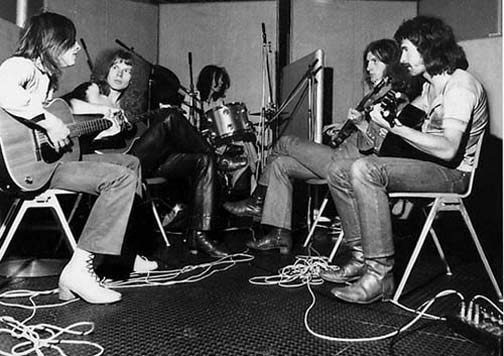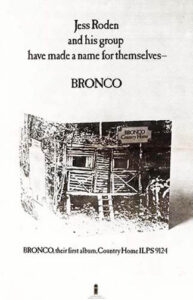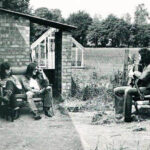
Back to 1970 –
“Guy started producing the album but our musical feelings were different so we ended up doing our own (production).
‘We had a demo of Love down on the sixteen-track and it turned out so well, we were allowed to do our own production. I did the first mix but I didn’t quite get enough quality into the recording so Island called Paul Samwell-Smith in to remix it”.
Pete Robinson – “We moved to Basing Street Studios (Island Records HQ) and set about the task of getting the first album together”
“Nearly all the first batch of song’s were Jess’ and we had thrashed these out many times at the village hall rehearsals so we were all familiar with them.”
“While ‘Diga’ was tape-op on the Country Home album, Jess had a lot of input on the final production.”
“Actually, I don’t think that any one of us, including Richard Digby Smith (Diga) who was engineering the sessions (a first time for him also) had any idea what or how proper records were made.
‘Kevyn was also writing for that first album as was Robbie… Johnny helped out a bit on some of the heavier things but he wasn’t really a writer.
‘I didn’t know anything really about the way I was recording having just done the vocal parts with Alan Bown so, we’d sort of sit around… and play. Lots of strumming went on actually.
‘If there was going to be an acoustic guitar then I’d play that but then we realised it would create leakage so that wasn’t too good…
‘Then, one of the things that did happen is that I’d be doing a vocal as well as playing and then they’d say, ‘Ohh its leaking into the acoustic and its going to spoil it’ so it ended up where there wouldn’t be a lot of live vocal.
‘We just played and then dubbed the vocal later, sometimes same day, sometimes anything up to a month later.
‘So, because there was a lot of acoustic guitars going on, we often had to record things without a guide vocal or I’d be isolated in some booth or other going la-de-dah which I never thought was the best for the songs.
‘It was alright and you basically had to do it like that otherwise you’d be leaking all over everybody.
‘The Country Home album was pretty much recorded on the back of very few gigs and so, in my opinion, has a ‘put together in the studio’ feel to it.
‘Anyway, we ended up with about ten tunes – and Paul Samwell-Smith was bought in to polish up and finish off the record.”
THE FIRST ALBUM
And, for this, their first album, the band were augmented by former Alan Bown sideman Jeff Bannister who played piano on two songs as well as Clifford T. Ward – who not only provided vocal back-ups on the track Home – but who also co-wrote Misfit On Your Stair.
‘CTW was a very good friend of Kevyn’s and so they occasionally wrote together.
‘When I was with the Raiders, he was known as Cliff Ward and his band were The Cruisers. They were without doubt, the best pop group in Kidderminster at the time.”
The Cruisers later became The Secrets who became popular around Birmingham as well as touring American army bases in France.
CTW recalled, “We used to work very hard, but I was the only one who was married with children. The others were able to pocket their money and have nights out in Paris while I would mail my money to my wife to enable her to pay the rent and feed the kids.
I used to walk in the forests of Fontainebleau and I remember working on Home Thoughts From Abroad on a lovely sunny day there.”
In 1968, after The Secrets dissolved, CTW eventually landed up teaching Drama and English at North Bromsgrove High School where one of his pupils was Trudie Styler (now known as Mrs Sting).
In his spare time, he continued songwriting and recorded his first solo album Singer Songwriter; he signed to Dandelion – John Peel’s label and, when that fell apart, landed up on Charisma, Tony Stratton-Smith’s label also home to the likes of Audience, Van Der Graf Generator and Genesis.
“During the Bronco years he had re-emerged as Clifford T Ward and was, signed to Island Publishing or Blue Mountain, Island’s Publishing company. He had one almighty hit single and a fairly successful album.”
The single was entitled Gaye selling over a million copies. He gave up teaching though making some rare appearances on radio or TV. Further success eluded CTW despite his songs being covered by Art Garfunkel, Judy Collins and Jack Jones.
In 1984, he was diagnosed with MS though had a huge difficulty accepting his predicament; he shunned medication, saying, “I refuse to believe that a cure can’t be found.”
During 1992, Kevyn Gammond wrote Shattered Life – a musical based on CTW that was staged at the Kidderminister College of Further Education. CTW released a further two albums but eventually died in 2001.
“The album cover was shot near Rusper on the borders of Surrey and W. Sussex at a house that Elaine and I had rented with another couple who were our good friends.
 ‘The house was single-story, made mainly of wood and built in a Japanese style (large picture widows and clad in bamboo) as was the garden which contained a swimming pool (drained and somewhat slimey) and a very large iron cage – we were told that it had once housed a Bear (cruel fuckers).
‘The house was single-story, made mainly of wood and built in a Japanese style (large picture widows and clad in bamboo) as was the garden which contained a swimming pool (drained and somewhat slimey) and a very large iron cage – we were told that it had once housed a Bear (cruel fuckers).
‘It was all set in eight acres of woodland and fronted by a lake complete with a couple of islands. The house (Laudate) was owned by Peter Asher, who, at that time, had become a major record producer in LA.
‘Neil Kingsbury, (pictured right) one of our friends, was a sound recordist working in television and at that time he was working on a show called ‘Nice Time’ which was the first television vehicle for Kenny Everett. Kenny was the previous tenant of Laudate and, kind of, passed it on to us.

